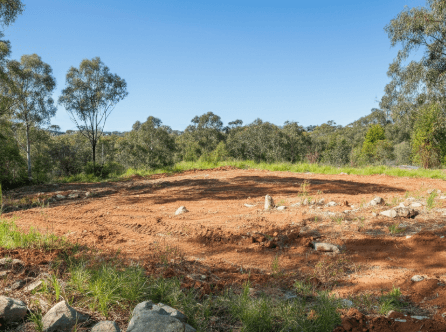What Does Undeveloped Land Mean? Undeveloped land refers to parcels of land that remain untouched by human development. These lands are accessible from buildings, roads, or any infrastructure, preserving their natural state. Regarding real estate, “undeveloped land” often surfaces in discussions. Understanding What Does Undeveloped Land Mean is crucial for anyone considering investment opportunities, conservation efforts, or simply seeking a deeper appreciation of nature’s unaltered beauty. This blog will delve into the characteristics, potential uses, and significance of undeveloped land in today’s world.
Prominent real estate investors like Steve Daria and Joleigh recognize the immense potential of undeveloped land. They believe that this raw land can be transformed into valuable assets with strategic planning and sustainable practices. Their insights highlight the importance of understanding and leveraging undeveloped land’s unique opportunities.
What Does Undeveloped Land Mean?
What does undeveloped land mean exactly? Undeveloped land is a property that has yet to be built upon or significantly modified by human activity.
Unlike developed land, which may host buildings, infrastructure, and other improvements, undeveloped land remains in its natural state.
This type of land can vary widely regarding terrain, vegetation, and accessibility.

Characteristics of Undeveloped Land
- Natural State: No significant human alterations.
- Varied Terrain: Can include forests, fields, different types of wetlands, and more.
- No Infrastructure: Typically needs utilities, roads, and buildings.
- Potential for Development: Offers numerous possibilities for future use.
Benefits of Investing in Undeveloped Land
Investing in undeveloped land presents several advantages, making it an attractive option for diverse stakeholders.
Lower Initial Cost
Undeveloped land is generally more affordable compared to developed properties.
This lower entry cost makes it accessible for investors looking to diversify their portfolios without a massive upfront investment.
Appreciation Potential
Over time, undeveloped land can be appreciated significantly, mainly in areas poised for growth.
As nearby development progresses, the value of the land can increase, offering substantial returns on investment.
Flexible Usage
One critical benefit of undeveloped land is its versatility. Investors and developers can shape the land according to their vision, whether for residential, commercial, agricultural, or recreational purposes.
Tax Benefits
In some jurisdictions, undeveloped land may qualify for lower property taxes than developed land.
Tax incentives and deductions may also be available to conserve natural habitats or engage in sustainable practices.
Get Started: Get Your Cash Offer Below…
We are direct land buyers. There are no commissions or fees and no obligation whatsoever. Start below by sharing where your property is and where we can send your offer…
Strategies for Developing Undeveloped Land
Transforming undeveloped land into a valuable asset requires careful planning and strategic execution. Here are some essential strategies to consider:
Conduct Thorough Due Diligence
Before purchasing undeveloped land, conduct comprehensive due diligence.
This involves researching zoning laws, environmental restrictions, soil quality, and utility access.
Grasping these factors will assist you in evaluating the viability of your development plans.
Create a Detailed Development Plan
Develop a clear and detailed plan outlining your vision for the land.
This plan should include site surveys, architectural designs, and a timeline for each development phase.
Collaborate with experts such as architects, engineers, and urban planners to ensure your plan is viable and compliant with local regulations.
Secure Financing
Financing undeveloped land can be different from securing loans for developed properties.
Explore financing options, including traditional bank loans, private lenders, and government grants.
A solid financial plan is crucial for executing your development project.
Obtain Necessary Permits
Securing the appropriate permits is a critical step in the land development process.
These permits may include zoning changes, building permits, environmental assessments, etc.
Working together with local authorities will help streamline this process.
Implement Sustainable Practices
Incorporating sustainable practices into your development can enhance the value of the land and attract environmentally conscious buyers.
Consider using renewable energy sources, preserving natural habitats, and implementing green building techniques.
Tips for Selling Undeveloped Land
If you’re looking to sell undeveloped land, the following can help you attract buyers and maximize your returns:
Highlight Potential Uses
Emphasize the versatility of the undeveloped land by showcasing potential uses.
Create marketing materials that illustrate various development possibilities, such as residential neighborhoods, commercial centers, or recreational facilities.
Provide Clear Documentation
Ensure all necessary documentation is readily available for potential buyers.
This includes property surveys, zoning information, environmental reports, and any permits obtained.
Transparency in these documents will build trust and facilitate a smoother transaction.

Competitive Pricing
Set a flexible price based on market research and comparable properties.
Appropriately pricing the land will attract serious buyers and expedite the selling process.
Leverage Online Platforms
Utilize online real estate platforms to reach a broader audience. Here are the best websites to sell your land.
Detailed descriptions, virtual tours, and high-quality photos can effectively showcase the land’s potential and attract interested buyers.
Engage a Real Estate Agent
Collaborating with a proficient and seasoned real estate agent specializing in undeveloped land can provide valuable insights and assistance.
They can help market the property, work a negotiation with buyers, and navigate the complexities of the selling process.
Frequently Asked Questions About “What Does Undeveloped Land Mean?”
Understanding what does undeveloped land mean can be confusing for many. This section will address common queries to help clarify its definition and implications.
What is the difference between undeveloped land and developed land?
Undeveloped land remains natural, without significant human modifications such as buildings or infrastructure.
Conversely, developed land has undergone construction, utilities, and road improvements.
Is undeveloped land a good investment?
Undeveloped land can be a good investment due to its lower initial cost, appreciation potential, and flexible usage.
However, realizing its total value requires thorough due diligence and strategic planning.
How do I finance the purchase of undeveloped land?
Undeveloped land can be financed through traditional bank loans, private lenders, or government grants.
A well-structured financial plan and exploration of various financing options are essential.
What are the risks associated with undeveloped land?
Risks include zoning restrictions, environmental concerns, lack of infrastructure, and potential market fluctuations.
Conducting in-depth due diligence and working with experts can help mitigate these risks.
How can I increase the value of undeveloped land?
Increasing the value of undeveloped land involves strategic development, securing necessary permits, implementing sustainable practices, and creating a detailed development plan.
Highlighting potential uses and providing clear documentation can also enhance its marketability.
Conclusion
Undeveloped land offers a world of possibilities for investors, developers, and buyers alike. By understanding what does undeveloped land mean, its characteristics, benefits, and development strategies, you can unlock the full potential of this valuable asset. Whether you’re looking to invest, develop, or sell undeveloped land, thorough research, strategic planning, and collaboration with experts are crucial to success.
Explore the opportunities that undeveloped land presents and take the first step towards realizing your vision. By leveraging the knowledge and information about what does undeveloped land mean in this guide, you’ll be ready to navigate the complexities of undeveloped land and make informed decisions that drive value and growth.
**NOTICE: Please note that the content presented in this post is intended solely for informational and educational purposes. It should not be construed as legal or financial advice or relied upon as a replacement for consultation with a qualified attorney or CPA. For specific guidance on legal or financial matters, readers are encouraged to seek professional assistance from an attorney, CPA, or other appropriate professional regarding the subject matter.
